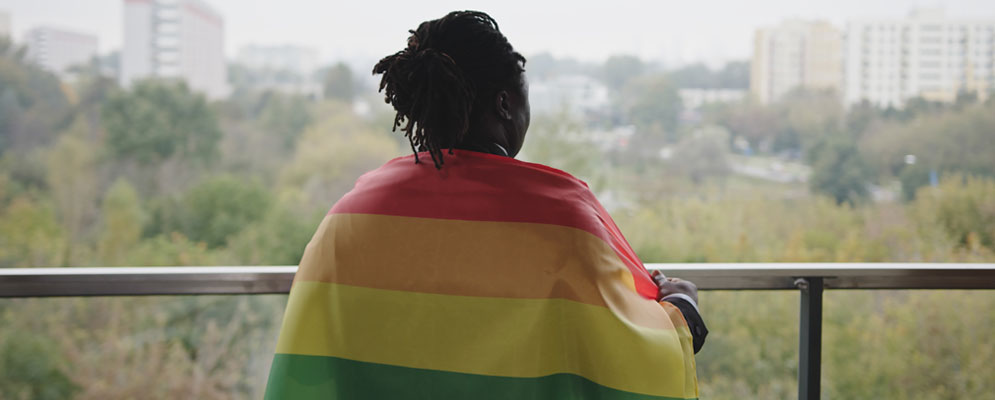Dear Editor,
I am an openly gay man based in Kenya. I am a proud African and to cite the words of the late South African President, Thabo Mbeki, “I am born of a people who are heroes and heroines, of a people who would not tolerate oppression. I am of a nation that would not allow that fear of death, torture, imprisonment, exile or persecution should result in the perpetuation of injustice. I am an African. I am born of the peoples of the continent of Africa.”
I want to ask why your newsroom seems to disregard, misrepresent and misinform your audience of heroes and heroines from this very continent that you and I call home. They are no different from you and me. Let me put it like this; I am no different from you; all I do is love differently but love nonetheless. Africa’s LGBTIQ community are part and parcel of the very fabric of this continent.
Even as we commemorate 30 years of the Windhoek Declaration, we are still primarily marginalised by the media, unless we are portrayed in a negative or sensational light. We are often shamed, ridiculed beaten, or bloodied when we do get any coverage.
As a member of the Kenyan fourth estate, I will admit I’ve seen some improvement in the coverage of the LGBTIQ community in some quarters of the local press. But there is so much more that needs to be done. We see more progress on digital platforms, but yet again, in the age of the internet, we are also seeing those same platforms being used for cyber-attacks, bullying and homophobia. Even as I write this, it saddens me that whenever there is a positive story about us, there are voices that are quick to silence and even threaten. You watch in silence as they negate any form of inclusivity, are discriminatory and devoid of progressive thinking, and it takes us several steps backwards.
I am an admirer of the African press. I recognise the role it has played in fighting colonialism and single-party rule, in promoting democracy and holding governments to account. There was a time here in Kenya that The Nation and Standard newspapers acted as the official opposition, speaking truth to power. When the Weekly Review, I remember as a child, would make its way home thanks to my father, I found it too wordy, with hardly any cartoons or content for a younger audience, but I remember how its then editor, Hillary Ngwe’no, was revered.
There were names like Bedan Mbugua, who edited Beyond Magazine, which highlighted the massive rigging in the 1988 general elections. Even during his time as editor at The People, they pushed the envelope in an era that is seen as seminal in Kenya’s history. Gitobu Imanyara, and his magazine, Nairobi Law Monthly, is another name from that time when the pen challenged the sword.
As you and I know, the Africa of the 80s lived under an autocratic and heavy sword. But during this period, many journalists dared. They risked much to tell the truth.
Editor, I don’t know whether you remember any of the names like Drum, Bona, Pace, True Love? Even as I write to you, I am filled with immense pride at their legacy and the footprint they left within me. Drum and True Love magazines were weekly staples (thanks to my elder brother), and it was within those magazines that matters of not just entertainment, fashion and lifestyle were covered, but they were brave enough to talk about sexual and relational issues. Drum had the Dear Dolly advice section at the back of the magazine that was a must-read. There was the rare occasion when homosexuality came up, and for a young man like myself, my eyes were being opened to a different form of sexuality. Dolly’s advice was far from PC, but I knew there were individuals who loved differently. I will forever remember the edition where one of our national goalkeepers rubbished claims about being homosexual. The mere fact that a taboo topic got into print was revolutionary, and it wasn’t about a foreigner. It was about one of our own. There were other Kenyan magazines like Men Only, which were ground-breaking in their content. The magazine bordered on the erotic with cartoons that had men and women in fine and solid African form that left very little to the imagination. You must remember this was all happening when my emotions were all over the place, and I had no one to ask for guidance or help. I was alone, and these magazines offered me the opportunity to tantalise my pubescent mind.
Editor, please indulge me, for I know I have gone via Mogadishu and Goma to get from Nairobi to Dar es Salaam. But as we commemorate 30 years of the Windhoek Declaration, as a media practitioner and consumer, I feel that there are still individuals like me who are missing in the newsrooms, on screen, on the radio and in the press. Our digital media seems to be making more headway, even though we know affordable access to data is still a privilege for many, our narratives and realities are normalised and visualised.
It is on the web that our African queerness comes out of the closest. There are an increasing number of podcasts, vlogs, Instagram pages and Twitter profiles that celebrate a more sexually and gender diverse Africa. Podcasts like Afroqueer, produce insightful and thought provoking episodes. The Rustin Times from Nigeria, covers all matters LGBTIQ from across the continent, Holaa! Africa has established itself as the website that celebrates women and gender non-conforming individuals from the continent. These are just a few.
Editor, don’t miss this ‘Africa Rising’ bus that is being driven by our younger people. I urge you to get back to educating, informing, and entertaining audiences and helping them see the various realities from our four corners. Too often, we hear the call for the bottom line or the push to go viral rather than the call for justice and for what is good, right and fair. The injustices that are taking place against LGBTIQ Africans need to be highlighted. Laws that still criminalise same-sex relations, and politicians who propagate lies against our own fellow Africans should be called out.
I call upon you to be on the right side of history. This continent is changing faster than we could have ever imagined. Our young people are seeing themselves in ways that they never thought was possible. Our queer stories are part and parcel of this continent. There are many LGBTIQ heroes, heroines or they-ines who are trailblazing in their own little way. They, too, need to be read about, seen, spoken of, normalised, and celebrated for who they are – Africans.
Yours truly
An African Queer
Kevin Mwachiro is a writer, journalist, podcaster and queer activist.

